-
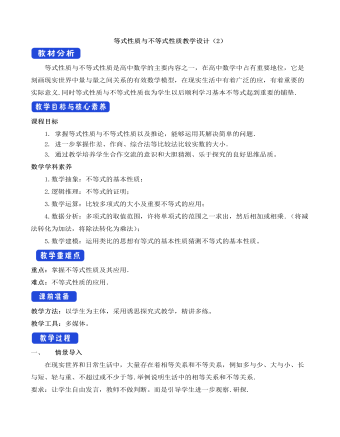
人教A版高中数学必修一等式性质与不等式性质教学设计(2)
等式性质与不等式性质是高中数学的主要内容之一,在高中数学中占有重要地位,它是刻画现实世界中量与量之间关系的有效数学模型,在现实生活中有着广泛的应,有着重要的实际意义.同时等式性质与不等式性质也为学生以后顺利学习基本不等式起到重要的铺垫.课程目标1. 掌握等式性质与不等式性质以及推论,能够运用其解决简单的问题.2. 进一步掌握作差、作商、综合法等比较法比较实数的大小. 3. 通过教学培养学生合作交流的意识和大胆猜测、乐于探究的良好思维品质。数学学科素养1.数学抽象:不等式的基本性质;2.逻辑推理:不等式的证明;3.数学运算:比较多项式的大小及重要不等式的应用;4.数据分析:多项式的取值范围,许将单项式的范围之一求出,然后相加或相乘.(将减法转化为加法,将除法转化为乘法);5.数学建模:运用类比的思想有等式的基本性质猜测不等式的基本性质。
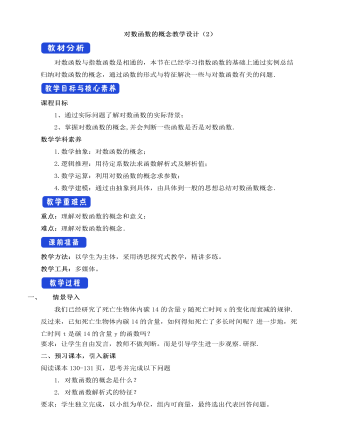
人教A版高中数学必修一对数函数的概念教学设计(2)
对数函数与指数函数是相通的,本节在已经学习指数函数的基础上通过实例总结归纳对数函数的概念,通过函数的形式与特征解决一些与对数函数有关的问题.课程目标1、通过实际问题了解对数函数的实际背景;2、掌握对数函数的概念,并会判断一些函数是否是对数函数. 数学学科素养1.数学抽象:对数函数的概念;2.逻辑推理:用待定系数法求函数解析式及解析值;3.数学运算:利用对数函数的概念求参数;4.数学建模:通过由抽象到具体,由具体到一般的思想总结对数函数概念.重点:理解对数函数的概念和意义;难点:理解对数函数的概念.教学方法:以学生为主体,采用诱思探究式教学,精讲多练。教学工具:多媒体。一、 情景导入我们已经研究了死亡生物体内碳14的含量y随死亡时间x的变化而衰减的规律.反过来,已知死亡生物体内碳14的含量,如何得知死亡了多长时间呢?进一步地,死亡时间t是碳14的含量y的函数吗?
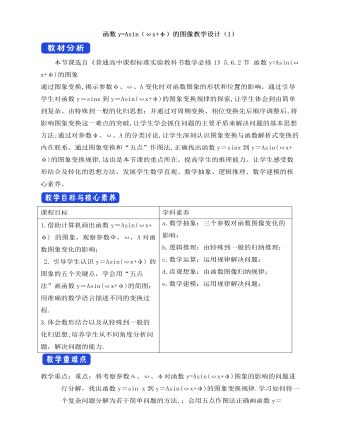
人教A版高中数学必修一函数y=Asin(ωχ+φ)教学设计(1)
本节课选自《普通高中课程标准实验教科书数学必修1》5.6.2节 函数y=Asin(ωx+φ)的图象通过图象变换,揭示参数φ、ω、A变化时对函数图象的形状和位置的影响。通过引导学生对函数y=sinx到y=Asin(ωx+φ)的图象变换规律的探索,让学生体会到由简单到复杂、由特殊到一般的化归思想;并通过对周期变换、相位变换先后顺序调整后,将影响图象变换这一难点的突破,让学生学会抓住问题的主要矛盾来解决问题的基本思想方法;通过对参数φ、ω、A的分类讨论,让学生深刻认识图象变换与函数解析式变换的内在联系。通过图象变换和“五点”作图法,正确找出函数y=sinx到y=Asin(ωx+φ)的图象变换规律,这也是本节课的重点所在。提高学生的推理能力。让学生感受数形结合及转化的思想方法。发展学生数学直观、数学抽象、逻辑推理、数学建模的核心素养。
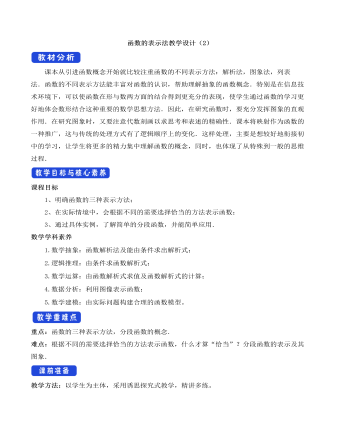
人教A版高中数学必修一函数的表示法教学设计(2)
课本从引进函数概念开始就比较注重函数的不同表示方法:解析法,图象法,列表法.函数的不同表示方法能丰富对函数的认识,帮助理解抽象的函数概念.特别是在信息技术环境下,可以使函数在形与数两方面的结合得到更充分的表现,使学生通过函数的学习更好地体会数形结合这种重要的数学思想方法.因此,在研究函数时,要充分发挥图象的直观作用.在研究图象时,又要注意代数刻画以求思考和表述的精确性.课本将映射作为函数的一种推广,这与传统的处理方式有了逻辑顺序上的变化.这样处理,主要是想较好地衔接初中的学习,让学生将更多的精力集中理解函数的概念,同时,也体现了从特殊到一般的思维过程.课程目标1、明确函数的三种表示方法;2、在实际情境中,会根据不同的需要选择恰当的方法表示函数;3、通过具体实例,了解简单的分段函数,并能简单应用.
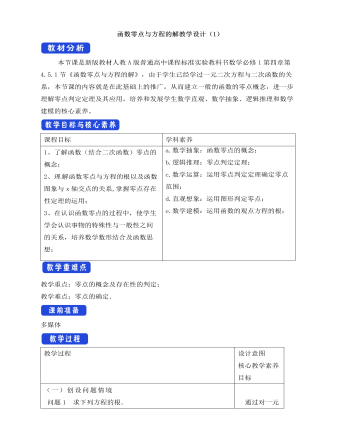
人教A版高中数学必修一函数的零点与方程的解教学设计(1)
本节课是新版教材人教A版普通高中课程标准实验教科书数学必修1第四章第4.5.1节《函数零点与方程的解》,由于学生已经学过一元二次方程与二次函数的关系,本节课的内容就是在此基础上的推广。从而建立一般的函数的零点概念,进一步理解零点判定定理及其应用。培养和发展学生数学直观、数学抽象、逻辑推理和数学建模的核心素养。1、了解函数(结合二次函数)零点的概念;2、理 解函数零点与方程的根以及函数图象与x轴交点的关系,掌握零点存在性定理的运用;3、在认识函数零点的过程中,使学生学会认识事物的特殊性与一般性之间的关系,培养数学数形结合及函数思想; a.数学抽象:函数零点的概念;b.逻辑推理:零点判定定理;c.数学运算:运用零点判定定理确定零点范围;d.直观想象:运用图形判定零点;e.数学建模:运用函数的观点方程的根;
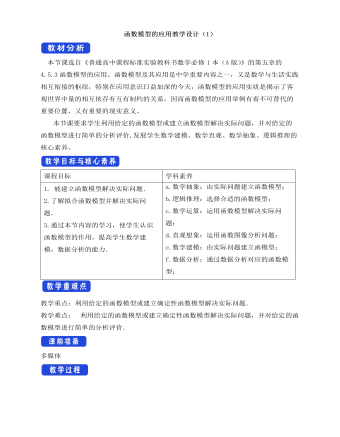
人教A版高中数学必修一函数模型的应用教学设计(1)
本节课选自《普通高中课程标准实验教科书数学必修1本(A版)》的第五章的4.5.3函数模型的应用。函数模型及其应用是中学重要内容之一,又是数学与生活实践相互衔接的枢纽,特别在应用意识日益加深的今天,函数模型的应用实质是揭示了客观世界中量的相互依存有互有制约的关系,因而函数模型的应用举例有着不可替代的重要位置,又有重要的现实意义。本节课要求学生利用给定的函数模型或建立函数模型解决实际问题,并对给定的函数模型进行简单的分析评价,发展学生数学建模、数学直观、数学抽象、逻辑推理的核心素养。1. 能建立函数模型解决实际问题.2.了解拟合函数模型并解决实际问题.3.通过本节内容的学习,使学生认识函数模型的作用,提高学生数学建模,数据分析的能力. a.数学抽象:由实际问题建立函数模型;b.逻辑推理:选择合适的函数模型;c.数学运算:运用函数模型解决实际问题;
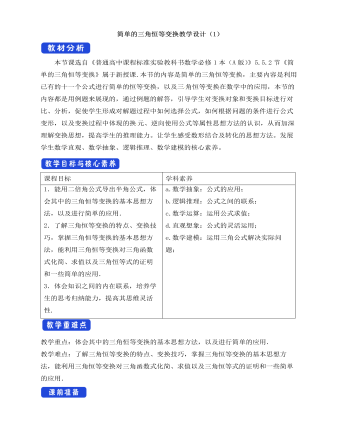
人教A版高中数学必修一简单的三角恒等变换教学设计(1)
四、小结1.知识:如何采用两角和或差的正余弦公式进行合角,借助三角函数的相关性质求值.其中三角函数最值问题是对三角函数的概念、图像和性质,以及诱导公式、同角三角函数基本关系、和(差)角公式的综合应用,也是函数思想的具体体现. 如何科学的把实际问题转化成数学问题,如何选择自变量建立数学关系式;求解三角函数在某一区间的最值问题.2.思想:本节课通过由特殊到一般方式把关系式 化成 的形式,可以很好地培养学生探究、归纳、类比的能力. 通过探究如何选择自变量建立数学关系式,可以很好地培养学生分析问题、解决问题的能力和应用意识,进一步培养学生的建模意识.五、作业1. 课时练 2. 预习下节课内容学生根据课堂学习,自主总结知识要点,及运用的思想方法。注意总结自己在学习中的易错点;
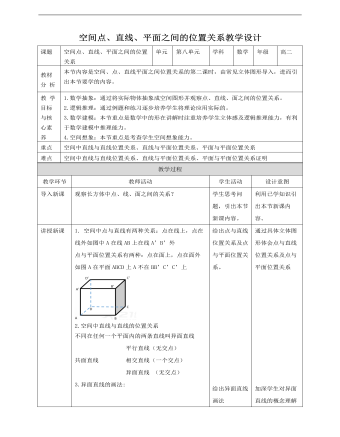
人教A版高中数学必修二空间点、直线、平面之间的位置关系教学设计
9.例二:如图,AB∩α=B,A?α, ?a.直线AB与a具有怎样的位置关系?为什么?解:直线AB与a是异面直线。理由如下:若直线AB与a不是异面直线,则它们相交或平行,设它们确定的平面为β,则B∈β, 由于经过点B与直线a有且仅有一个平面α,因此平面平面α与β重合,从而 , 进而A∈α,这与A?α矛盾。所以直线AB与a是异面直线。补充说明:例二告诉我们一种判断异面直线的方法:与一个平面相交的直线和这个平面内不经过交点的直线是异面直线。10. 例3 已知a,b,c是三条直线,如果a与b是异面直线,b与c是异面直线,那么a与c有怎样的位置关系?并画图说明.解: 直线a与直线c的位置关系可以是平行、相交、异面.如图(1)(2)(3).总结:判定两条直线是异面直线的方法(1)定义法:由定义判断两条直线不可能在同一平面内.
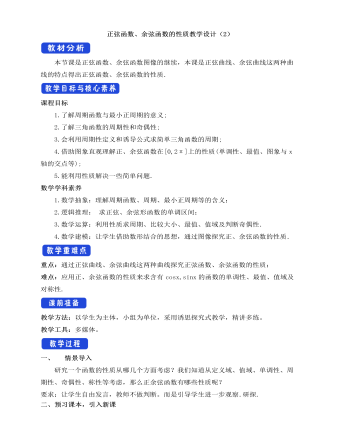
人教A版高中数学必修一正弦函数、余弦函数的性质教学设计(2)
本节课是正弦函数、余弦函数图像的继续,本课是正弦曲线、余弦曲线这两种曲线的特点得出正弦函数、余弦函数的性质. 课程目标1.了解周期函数与最小正周期的意义;2.了解三角函数的周期性和奇偶性;3.会利用周期性定义和诱导公式求简单三角函数的周期;4.借助图象直观理解正、余弦函数在[0,2π]上的性质(单调性、最值、图象与x轴的交点等);5.能利用性质解决一些简单问题. 数学学科素养1.数学抽象:理解周期函数、周期、最小正周期等的含义; 2.逻辑推理: 求正弦、余弦形函数的单调区间;3.数学运算:利用性质求周期、比较大小、最值、值域及判断奇偶性.4.数学建模:让学生借助数形结合的思想,通过图像探究正、余弦函数的性质.重点:通过正弦曲线、余弦曲线这两种曲线探究正弦函数、余弦函数的性质; 难点:应用正、余弦函数的性质来求含有cosx,sinx的函数的单调性、最值、值域及对称性.
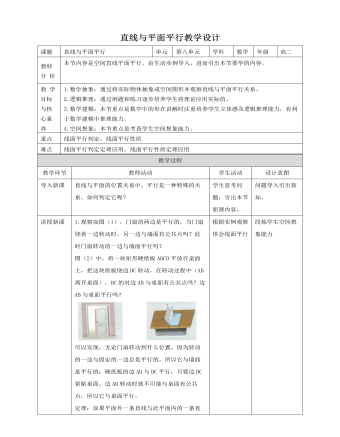
人教A版高中数学必修二直线与直线垂直教学设计
6.例二:如图在正方体ABCD-A’B’C’D’中,O’为底面A’B’C’D’的中心,求证:AO’⊥BD 证明:如图,连接B’D’,∵ABCD-A’B’C’D’是正方体∴BB’//DD’,BB’=DD’∴四边形BB’DD’是平行四边形∴B’D’//BD∴直线AO’与B’D’所成角即为直线AO’与BD所成角连接AB’,AD’易证AB’=AD’又O’为底面A’B’C’D’的中心∴O’为B’D’的中点∴AO’⊥B’D’,AO’⊥BD7.例三如图所示,四面体A-BCD中,E,F分别是AB,CD的中点.若BD,AC所成的角为60°,且BD=AC=2.求EF的长度.解:取BC中点O,连接OE,OF,如图。∵E,F分别是AB,CD的中点,∴OE//AC且OE=1/2AC,OF//AC且OF=1/2BD,∴OE与OF所成的锐角就是AC与BD所成的角∵BD,AC所成角为60°,∴∠EOF=60°或120°∵BD=AC=2,∴OE=OF=1当∠EOF=60°时,EF=OE=OF=1,当∠EOF=120°时,取EF的中点M,连接OM,则OM⊥EF,且∠EOM=60°∴EM= ,∴EF=2EM=
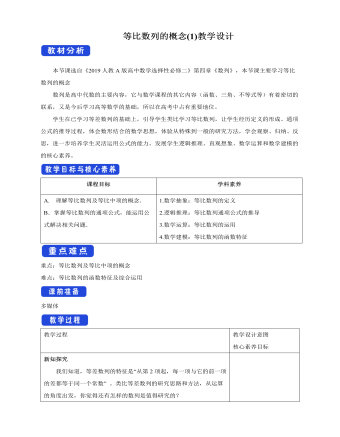
人教版高中数学选择性必修二等比数列的概念 (1) 教学设计
新知探究我们知道,等差数列的特征是“从第2项起,每一项与它的前一项的差都等于同一个常数” 。类比等差数列的研究思路和方法,从运算的角度出发,你觉得还有怎样的数列是值得研究的?1.两河流域发掘的古巴比伦时期的泥版上记录了下面的数列:9,9^2,9^3,…,9^10; ①100,100^2,100^3,…,100^10; ②5,5^2,5^3,…,5^10. ③2.《庄子·天下》中提到:“一尺之锤,日取其半,万世不竭.”如果把“一尺之锤”的长度看成单位“1”,那么从第1天开始,每天得到的“锤”的长度依次是1/2,1/4,1/8,1/16,1/32,… ④3.在营养和生存空间没有限制的情况下,某种细菌每20 min 就通过分裂繁殖一代,那么一个这种细菌从第1次分裂开始,各次分裂产生的后代个数依次是2,4,8,16,32,64,… ⑤4.某人存入银行a元,存期为5年,年利率为 r ,那么按照复利,他5年内每年末得到的本利和分别是a(1+r),a〖(1+r)〗^2,a〖(1+r)〗^3,a〖(1+r)〗^4,a〖(1+r)〗^5 ⑥
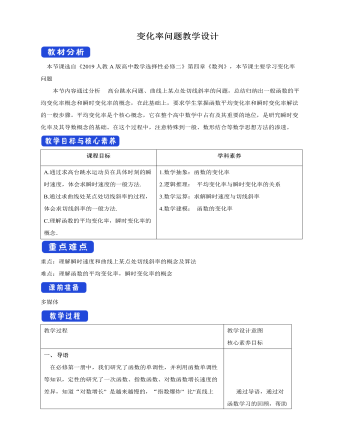
人教版高中数学选择性必修二变化率问题教学设计
导语在必修第一册中,我们研究了函数的单调性,并利用函数单调性等知识,定性的研究了一次函数、指数函数、对数函数增长速度的差异,知道“对数增长” 是越来越慢的,“指数爆炸” 比“直线上升” 快得多,进一步的能否精确定量的刻画变化速度的快慢呢,下面我们就来研究这个问题。新知探究问题1 高台跳水运动员的速度高台跳水运动中,运动员在运动过程中的重心相对于水面的高度h(单位:m)与起跳后的时间t(单位:s)存在函数关系h(t)=-4.9t2+4.8t+11.如何描述用运动员从起跳到入水的过程中运动的快慢程度呢?直觉告诉我们,运动员从起跳到入水的过程中,在上升阶段运动的越来越慢,在下降阶段运动的越来越快,我们可以把整个运动时间段分成许多小段,用运动员在每段时间内的平均速度v ?近似的描述它的运动状态。
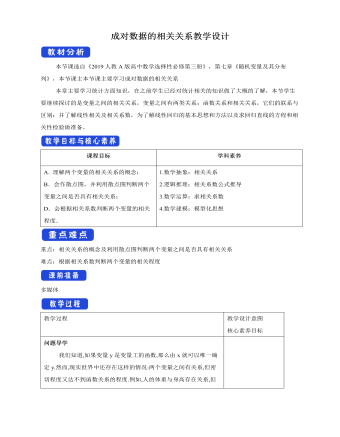
人教版高中数学选修3成对数据的相关关系教学设计
由样本相关系数??≈0.97,可以推断脂肪含量和年龄这两个变量正线性相关,且相关程度很强。脂肪含量与年龄变化趋势相同.归纳总结1.线性相关系数是从数值上来判断变量间的线性相关程度,是定量的方法.与散点图相比较,线性相关系数要精细得多,需要注意的是线性相关系数r的绝对值小,只是说明线性相关程度低,但不一定不相关,可能是非线性相关.2.利用相关系数r来检验线性相关显著性水平时,通常与0.75作比较,若|r|>0.75,则线性相关较为显著,否则不显著.例2. 有人收集了某城市居民年收入(所有居民在一年内收入的总和)与A商品销售额的10年数据,如表所示.画出散点图,判断成对样本数据是否线性相关,并通过样本相关系数推断居民年收入与A商品销售额的相关程度和变化趋势的异同.
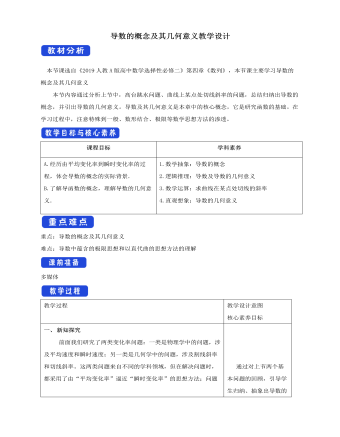
人教版高中数学选择性必修二导数的概念及其几何意义教学设计
新知探究前面我们研究了两类变化率问题:一类是物理学中的问题,涉及平均速度和瞬时速度;另一类是几何学中的问题,涉及割线斜率和切线斜率。这两类问题来自不同的学科领域,但在解决问题时,都采用了由“平均变化率”逼近“瞬时变化率”的思想方法;问题的答案也是一样的表示形式。下面我们用上述思想方法研究更一般的问题。探究1: 对于函数y=f(x) ,设自变量x从x_0变化到x_0+ ?x ,相应地,函数值y就从f(x_0)变化到f(〖x+x〗_0) 。这时, x的变化量为?x,y的变化量为?y=f(x_0+?x)-f(x_0)我们把比值?y/?x,即?y/?x=(f(x_0+?x)-f(x_0)" " )/?x叫做函数从x_0到x_0+?x的平均变化率。1.导数的概念如果当Δx→0时,平均变化率ΔyΔx无限趋近于一个确定的值,即ΔyΔx有极限,则称y=f (x)在x=x0处____,并把这个________叫做y=f (x)在x=x0处的导数(也称为__________),记作f ′(x0)或________,即
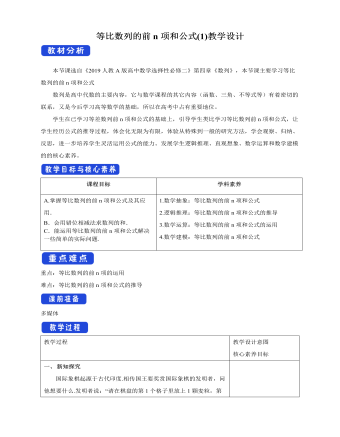
人教版高中数学选择性必修二等比数列的前n项和公式 (1) 教学设计
新知探究国际象棋起源于古代印度.相传国王要奖赏国际象棋的发明者,问他想要什么.发明者说:“请在棋盘的第1个格子里放上1颗麦粒,第2个格子里放上2颗麦粒,第3个格子里放上4颗麦粒,依次类推,每个格子里放的麦粒都是前一个格子里放的麦粒数的2倍,直到第64个格子.请给我足够的麦粒以实现上述要求.”国王觉得这个要求不高,就欣然同意了.假定千粒麦粒的质量为40克,据查,2016--2017年度世界年度小麦产量约为7.5亿吨,根据以上数据,判断国王是否能实现他的诺言.问题1:每个格子里放的麦粒数可以构成一个数列,请判断分析这个数列是否是等比数列?并写出这个等比数列的通项公式.是等比数列,首项是1,公比是2,共64项. 通项公式为〖a_n=2〗^(n-1)问题2:请将发明者的要求表述成数学问题.
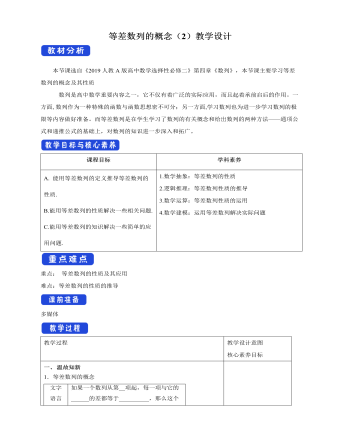
人教版高中数学选择性必修二等差数列的概念(2)教学设计
二、典例解析例3.某公司购置了一台价值为220万元的设备,随着设备在使用过程中老化,其价值会逐年减少.经验表明,每经过一年其价值会减少d(d为正常数)万元.已知这台设备的使用年限为10年,超过10年 ,它的价值将低于购进价值的5%,设备将报废.请确定d的范围.分析:该设备使用n年后的价值构成数列{an},由题意可知,an=an-1-d (n≥2). 即:an-an-1=-d.所以{an}为公差为-d的等差数列.10年之内(含10年),该设备的价值不小于(220×5%=)11万元;10年后,该设备的价值需小于11万元.利用{an}的通项公式列不等式求解.解:设使用n年后,这台设备的价值为an万元,则可得数列{an}.由已知条件,得an=an-1-d(n≥2).所以数列{an}是一个公差为-d的等差数列.因为a1=220-d,所以an=220-d+(n-1)(-d)=220-nd. 由题意,得a10≥11,a11<11. 即:{█("220-10d≥11" @"220-11d<11" )┤解得19<d≤20.9所以,d的求值范围为19<d≤20.9
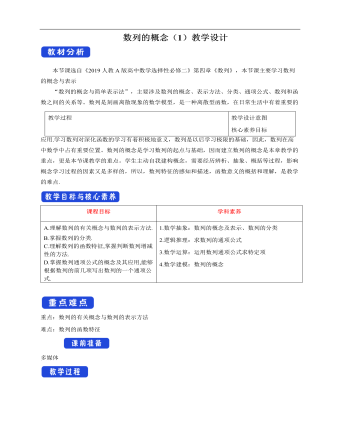
人教版高中数学选择性必修二数列的概念(1)教学设计
情景导学古语云:“勤学如春起之苗,不见其增,日有所长”如果对“春起之苗”每日用精密仪器度量,则每日的高度值按日期排在一起,可组成一个数列. 那么什么叫数列呢?二、问题探究1. 王芳从一岁到17岁,每年生日那天测量身高,将这些身高数据(单位:厘米)依次排成一列数:75,87,96,103,110,116,120,128,138,145,153,158,160,162,163,165,168 ①记王芳第i岁的身高为 h_i ,那么h_1=75 , h_2=87, 〖"…" ,h〗_17=168.我们发现h_i中的i反映了身高按岁数从1到17的顺序排列时的确定位置,即h_1=75 是排在第1位的数,h_2=87是排在第2位的数〖"…" ,h〗_17 =168是排在第17位的数,它们之间不能交换位置,所以①具有确定顺序的一列数。2. 在两河流域发掘的一块泥板(编号K90,约生产于公元前7世纪)上,有一列依次表示一个月中从第1天到第15天,每天月亮可见部分的数:5,10,20,40,80,96,112,128,144,160,176,192,208,224,240. ②
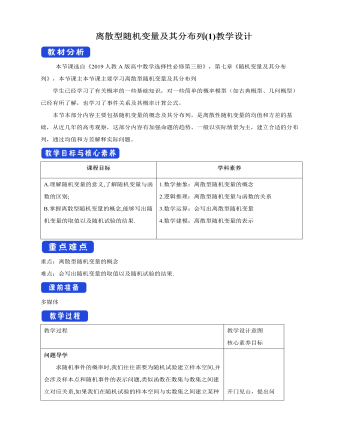
人教版高中数学选修3离散型随机变量及其分布列(1)教学设计
4.写出下列随机变量可能取的值,并说明随机变量所取的值表示的随机试验的结果.(1)一个袋中装有8个红球,3个白球,从中任取5个球,其中所含白球的个数为X.(2)一个袋中有5个同样大小的黑球,编号为1,2,3,4,5,从中任取3个球,取出的球的最大号码记为X.(3). 在本例(1)条件下,规定取出一个红球赢2元,而每取出一个白球输1元,以ξ表示赢得的钱数,结果如何?[解] (1)X可取0,1,2,3.X=0表示取5个球全是红球;X=1表示取1个白球,4个红球;X=2表示取2个白球,3个红球;X=3表示取3个白球,2个红球.(2)X可取3,4,5.X=3表示取出的球编号为1,2,3;X=4表示取出的球编号为1,2,4;1,3,4或2,3,4.X=5表示取出的球编号为1,2,5;1,3,5;1,4,5;2,3,5;2,4,5或3,4,5.(3) ξ=10表示取5个球全是红球;ξ=7表示取1个白球,4个红球;ξ=4表示取2个白球,3个红球;ξ=1表示取3个白球,2个红球.
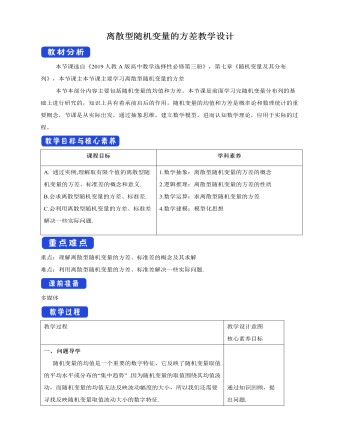
人教版高中数学选修3离散型随机变量的方差教学设计
3.下结论.依据均值和方差做出结论.跟踪训练2. A、B两个投资项目的利润率分别为随机变量X1和X2,根据市场分析, X1和X2的分布列分别为X1 2% 8% 12% X2 5% 10%P 0.2 0.5 0.3 P 0.8 0.2求:(1)在A、B两个项目上各投资100万元, Y1和Y2分别表示投资项目A和B所获得的利润,求方差D(Y1)和D(Y2);(2)根据得到的结论,对于投资者有什么建议? 解:(1)题目可知,投资项目A和B所获得的利润Y1和Y2的分布列为:Y1 2 8 12 Y2 5 10P 0.2 0.5 0.3 P 0.8 0.2所以 ;; 解:(2) 由(1)可知 ,说明投资A项目比投资B项目期望收益要高;同时 ,说明投资A项目比投资B项目的实际收益相对于期望收益的平均波动要更大.因此,对于追求稳定的投资者,投资B项目更合适;而对于更看重利润并且愿意为了高利润承担风险的投资者,投资A项目更合适.
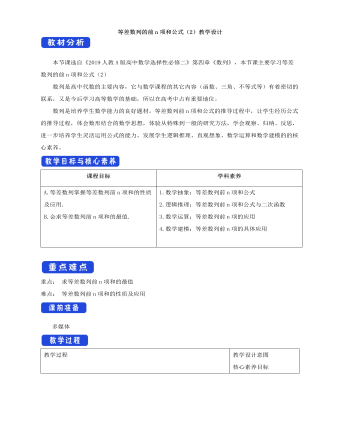
人教版高中数学选择性必修二等差数列的前n项和公式(2)教学设计
课前小测1.思考辨析(1)若Sn为等差数列{an}的前n项和,则数列Snn也是等差数列.( )(2)若a1>0,d<0,则等差数列中所有正项之和最大.( )(3)在等差数列中,Sn是其前n项和,则有S2n-1=(2n-1)an.( )[答案] (1)√ (2)√ (3)√2.在项数为2n+1的等差数列中,所有奇数项的和为165,所有偶数项的和为150,则n等于( )A.9 B.10 C.11 D.12B [∵S奇S偶=n+1n,∴165150=n+1n.∴n=10.故选B项.]3.等差数列{an}中,S2=4,S4=9,则S6=________.15 [由S2,S4-S2,S6-S4成等差数列得2(S4-S2)=S2+(S6-S4)解得S6=15.]4.已知数列{an}的通项公式是an=2n-48,则Sn取得最小值时,n为________.23或24 [由an≤0即2n-48≤0得n≤24.∴所有负项的和最小,即n=23或24.]二、典例解析例8.某校新建一个报告厅,要求容纳800个座位,报告厅共有20排座位,从第2排起后一排都比前一排多两个座位. 问第1排应安排多少个座位?分析:将第1排到第20排的座位数依次排成一列,构成数列{an} ,设数列{an} 的前n项和为S_n。





















